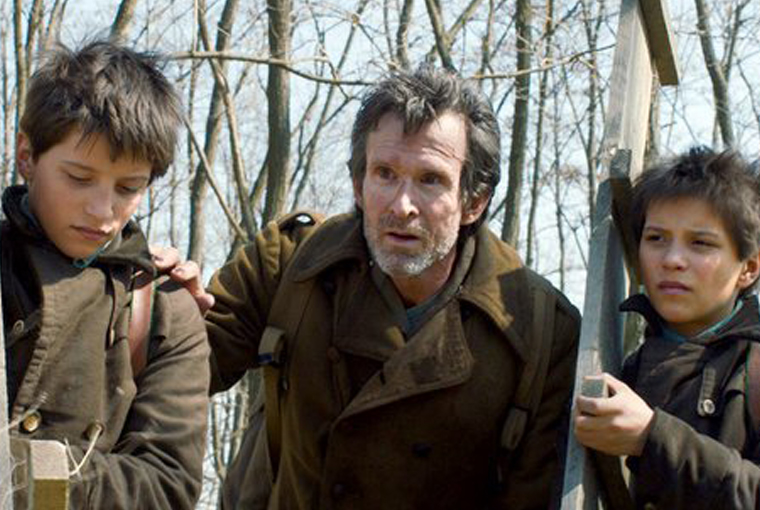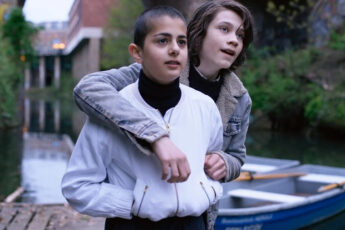Boy Survivors
The Perversion of War in János Szász’s The Notebook (A nagy füzet, 2013)
Vol. 39 (March 2014) by Julia Zelman
The World War II film has become a genre in itself, with a plethora of established themes: aside from military action films, there is the survival tale and the tale of moral compromise that grapples with the horror of ordinary people’s cruelty and indifference. János Szász’s The Notebook combines some features of both these subgenres. Its twin boy protagonists (András and Lászlo Gyémánt; the characters are nameless) are victims of the war, sent from their cozy apartment to a brutish, estranged grandmother’s house in the country. From well-behaved children, they transform into ruthless opportunists. But who is responsible for this metamorphosis? The Grandmother (Piroska Molnár), a massive, dragon-like woman who calls the boys “the Bastards” and forces them to spend their first night outside, has a hand in depriving them of their civilized veneer. But the film shows the boys in determined pursuit of their own dehumanization, which, with uncanny prescience, they recognize as the only way to survive the war. The end result is an uneasy psychological reading of the War as a forge for new Supermen, as resistant to familial tenderness as to pain, hunger and cold.
The notebook of the title given to them by their parents to help them keep track of their studies during the war becomes at once a record and an instrument of this process. At first the book receives merely words and pasted-in photos. Gradually, it amasses found objects and crude, alarming drawings and eventually rows and rows of dead bugs, victims of the boys’ “practice killings.” During an aesthetically brilliant moment of the film, the drawings come to life and we see the all-too-familiar images from the Holocaust repeat in stick-figure form: mass hangings, summary executions, and the infamous march toward the trains to the east. This is quite effective in showing the effects of war on young psyches and is as succinct a method as any of reminding us of these atrocities.
Yet the brothers’ actions, supposedly deprived of moral grounds, are so ambiguous that we cannot determine what exactly their goals are, or whether any traces of traditional morality have survived within them. Seemingly willing to sacrifice anything or anyone to survive together, they occasionally become implacable avengers of the wronged. One day, the pastor’s pretty maid (Diána Kiss) takes the boys to her apartment to bathe and feed them. What at first begins as sisterly teasing in the bathtub briefly becomes a sexual act, leaving the boys perplexed but not too disturbed. During their lunch a short time later, the town’s Jews are driven through the streets toward the transports. The maid, her mouth full of toast, rushes to the window and calls to the Nazis: “Wait! Don’t forget the shoemaker!” Some soldiers head off in the direction of her pointing finger.
Unfortunately for her, the Jewish shoemaker had once shown the twins an act of kindness, and when the boys find him murdered in his shop with his own hammer, they decide on a spectacular act of revenge against the maid. The young woman’s cruelty and sexual perversion has probably turned the audience against her, but the fact remains that this vengeance is near-arbitrary and does not touch the Nazis themselves. Indeed, aside from the shoemaker and an ill-fated neighbor girl, the boys’ only friend is a wounded Nazi officer (Ulrich Thomsen), who himself seems almost a force beyond good and evil.
The boys’ rejection of society is also a return to a more atavistic time. The boys develop a bond with their grandmother, the “witch,” and regress deeper and deeper into the forest. Herein lies the danger of The Notebook, for if the twins don’t adopt Nazism’s race-based doctrines, they share its casual acceptance of killing. The filmmaker probably intended this atavism-Fascism analogy as a parable for the barbarity of human nature, but it may seem as though Nazism (as well as Soviet war atrocities) is being cast as a mere element in a dark fairy story in parallel to the almost magical bond between the two brothers. The end result is an often beautiful but rather queasy Holocaust fantasy, history as psychological folktale writ large.




Leave a Comment